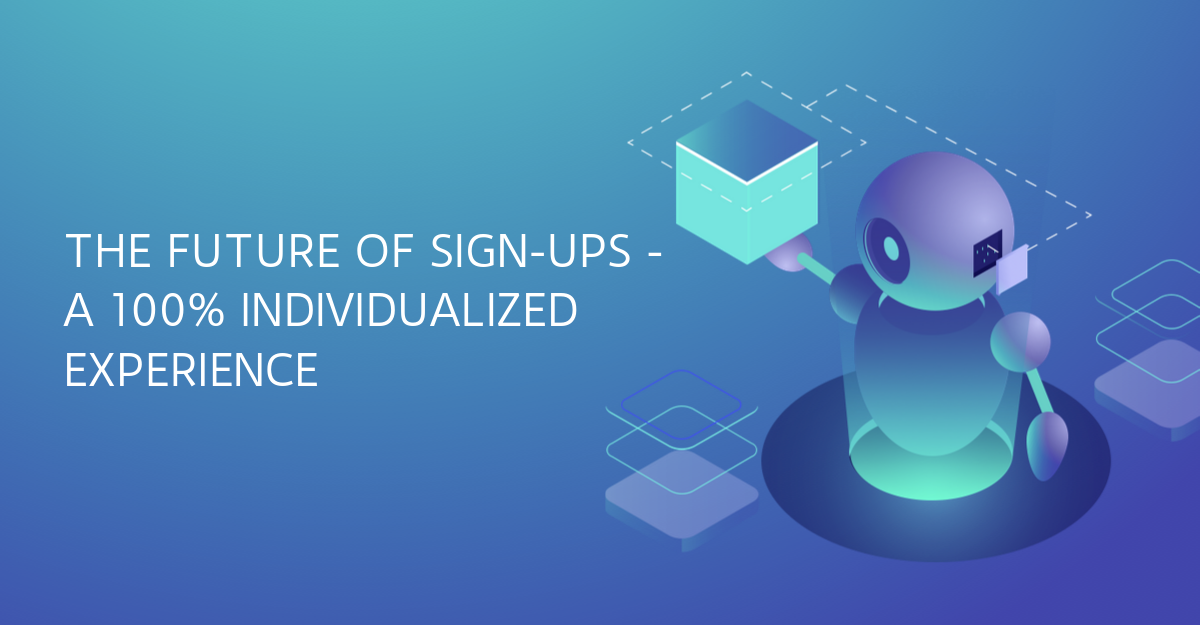
By now, it’s beyond doubt that what people want is a personalized web experience. Even though studies and research about this often focus on personalization in marketing, e-commerce, and fintech, there is no reason to believe that customers will not welcome a personalized sign-up flow — it’s just that no one else has made one yet.
At Regily we are enjoying ourselves with building advanced Machine Learning models to explore previously unexplored territory — how to make signing up a completely individualized experience. Our focus is slowly but steadily shifting from customization and personalization to hyper-personalization and ultimately: 100% individualization.
We’re past the era when AI and Machine Learning were buzzwords, a hype, and something to worry about with doomsday-like prophecies of how machines will take over our jobs (and the world, according to some more pessimistic theories). Machine Learning in its many forms is now a sheer necessity to succeed in today’s tech landscape. For us, that means ML needs to be fully embedded into our framework, as this allows us to meet customers’ increasing demands and expectations online.
The challenge of individualization needs non-human help
Individualized sign-ups, how? You probably ask in awe and excitement. I’m gonna pass the question on to someone who’s more qualified to answer that than me: our Head of Analytics, Natalia Lyarskaya. She says:
First, we need to know the users. That might sound obvious, but to really know them we need to understand how people behave online, and more specifically for us — how they behave while creating an online account.
Sounds cool, but can’t we just A/B test? Well, traditional A/B testing isn’t really scalable. It takes time, human resources, and is limited in terms of how many tests you can run at the same time. Often A also wants some aspects of B, and before you know it you find yourself running tests throughout the whole alphabet.
Natalia elaborates:
"With predictive models, testing becomes more scalable, faster, and bigger as it’s possible to run hundreds of tests simultaneously. When it’s all built in a fully scalable and automated manner, we can keep our experimenting culture but learn much, much faster.”
Taking personalization to the next level
We already offer personalized sign-ups in many aspects based on certain data points, and our rule-based models will tailor the signup journey to that specific user. Now, however, we are taking personalization one huge leap further, heavily relying on predictive modeling.
As of now, we are identifying segments of users and adapting the sign-up journey to that: a user in Sweden signing up from desktop will get a different experience than someone from Indonesia using iPhone. But there’s so much more than that we can do!
Imagine this: We know that a user is in Sweden and uses a stationary computer. What if we also know that she has a slow internet connection, lives in a rural area, is missing two keys on her keyboard and doesn’t have the latest version of Windows? Then we have the other person in Indonesia who has a brand new iPhone, he types really really fast but autocorrects a lot and he flips his device horizontally. These two will experience two very, very different sign-up journeys.
Behavioral data leads the way
With smart architecture and tons and tons of behavioral data like the examples above, we can create advanced models that quickly analyse how people interact with a registration flow down to an extremely detailed level. Which in turn gives us everything we need to know to provide unique experiences for each individual.
Natalia explains.
But let’s not get carried away and be creepy…
It’s always a trade-off to provide the best personal experience without asking for too much data. People can be skeptical to share data about themselves and that’s why we strictly rely on behavioral data only — we do not store any personal data.
I imagine more than a few of you who read this are pretty tech-savvy so let’s dig a bit deeper. Machine Learning, predictive modeling, advanced architecture — it sounds very cool, but what does it mean in practice, really?
Using ML to predict outcomes
With predictive segmentation, we automatically cluster users which makes us able to identify other users with similar behavior and highlight the differences between them. Then we add on predictive models which in turn allows us to move from clustering to creating completely individual journeys. Again, back to Natalia:
One algorithm we love, collaborative filtering, helps our system learn from previous users’ similar behavior. A user with certain characteristics, say one who speaks German, lives in the US, and has an Android phone, gets a specific sign-up journey tailored to those characteristics. The system then tweaks the journey for the next user with the exact same characteristics. And so it goes, the system learns what works best and converts best, and continuously improves the accuracy of the algorithm.
To round it off…
The conclusion is pretty clear: Advanced Machine Learning is Alpha and Omega to create that sweet, sweet personalized online experience that we are all looking for.
Curious about how our tech can grow your sign-ups and increase your likeability? Go to regily.com and request a demo!